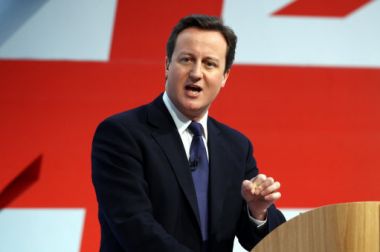Cameron's 'doing' God: Does it reveal a shift in British politics?

Following David Cameron's recent remarks that Britain is a "Christian country" and "what we need more of is evangelism", the faith and politics debate has been ripped wide open once again.
Criticism has been levelled at the Prime Minister from all angles; from secularists who claim offence at the definition of the UK as 'Christian', to those of the faith who have questioned Cameron's sincerity and the political motivation behind his comments.
Some have been more gracious, however. Former Labour Foreign Secretary Jack Straw has noted that Christian principles do indeed "permeate our sense of citizenship", while member of the General Synod Christina Rees told the BBC that the UK is, in fact, "historically and culturally" a Christian country.
Anglican blogger Archbishop Cranmer has also joined the debate, welcoming Cameron's comments and adding that it is not up to anyone to question the validity of another's faith.
"His conscience may not be overly sensitive, but it is not to be condemned. We are exhorted and encouraged to accept other Christians wherever they are in their pilgrimage of faith; however imperfect their learning; however flawed their understanding.
"And that includes a Tory prime minister," he writes.
Optimists believe that new scene is being set, where politicians are able to discuss their faith more freely and openly – which hasn't always been the case. Former Prime Minister Tony Blair's communications director Alistair Campbell once infamously remarked: "We don't do God."
But is it really the case that those in the political sphere are now able to share their beliefs?
Stephen Beer, Political Communications Officer at Christians on the Left, contends that the landscape is changing.
"I think it actually is an easier atmosphere than 10 years ago. When politicians talk about faith in an open way and in a way that is not condemning then it's a healthy thing," he says.
"What we would say at Christians on the Left is that it's not just about a label, but about how that faith is lived out.
"[Our view] is that what matters most are values rather than the labels that we put on the country. Britain is rich in Christian heritage and we should cherish that. If you look at the census, the majority of people label themselves Christians and that's not something to be dismissed.
"But giving ourselves a title as a Christian country should be a standard that we aspire to and measure ourselves against, rather than a label that we put on ourselves and that's it. Faith is putting belief into action, and what we would say is that values of equality, fairness, concern for the poor – these are the values that we need to judge policies by, and whether they're being put into practice or not."
Bishop of Swansea and Brecon John Davies agrees.
"As for the Prime Minister's recent comments, I welcome any encouragement offered by anyone to anyone to live life as a Christian and to understand more deeply the truth of the Christian faith rather than to simply see religious practice as habitual participation in the life of an institutional church," he says.
"Churchgoing doesn't always equate with Christianity, I fear. The institution, to be credible and Christian, must be one which lives out and announces the principles for which it came into being, not just there to perpetuate its own existence."
One thing Stephen is clear to state is that faith should be in the public square.
"Faith and politics can mix, but faith and policies should mix too," he says.
"Christianity is about public witness, and it's right that people should be free and able to talk about their faith. I think it's easier than it used to be, but people in this country are shrewd; they're looking not just for words, but for actions too.
"They're looking at integrity of belief, so while no one is perfect, it's important that anyone speaking about faith does so from a position of integrity."
While Cameron has obviously seen an opportunity to share his beliefs, Stephen contends that there is more to be done before real dialogue about faith is welcomed wholeheartedly into political discourse.
"When any politician talks about faith it's difficult, because everyone immediately suspects their motives, and we do have to be on guard against anyone from any party who might be using their faith to get votes. But on the other hand, we should welcome people talking about their faith. It shouldn't be controversial," he says.
"I think the real controversy this Easter has been that it's considered controversial for a Prime Minister to talk about his faith."











